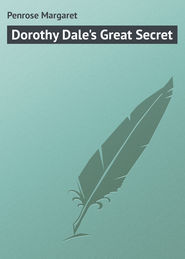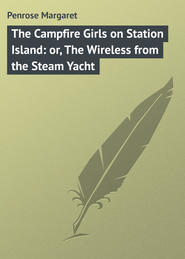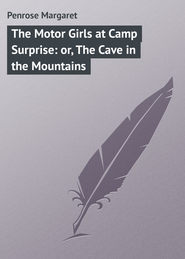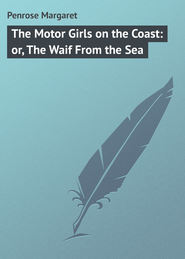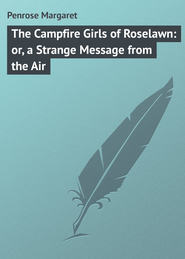По всем вопросам обращайтесь на: info@litportal.ru
(©) 2003-2024.
✖
The Motor Girls at Lookout Beach: or, In Quest of the Runaways
Настройки чтения
Размер шрифта
Высота строк
Поля
The Motor Girls at Lookout Beach: or, In Quest of the Runaways
Margaret Penrose
Penrose Margaret
The Motor Girls at Lookout Beach; Or, In Quest of the Runaways
CHAPTER I – SUMMER PLANS
Bess Robinson was so filled with enthusiasm that her sister Belle declared there was serious danger of “blowing-up,” unless there was some repression. Belle herself might be equally enthusiastic, but she had a way of restraining herself, while Bess just delighted in the “utmost” of everything. The two sisters were talking on the side porch of their handsome home in Chelton, a New England town, located on the Chelton river. It was a beautiful day, late in spring.
“Well, have you sufficiently quieted down, Bess?” asked Belle, after a pause, which succeeded the more quiet girl’s attempt to curb her sister’s enthusiasm – a pause that was filled with just the hint of pique.
“Quieted down? I should think any one would quiet down after such a call-down as you gave me, if you will allow the use of such slang in your presence, Miss Prim,” retorted Bess, with a little tilt to her stubby nose.
“Oh, come now, Bess – ”
“Well, don’t be so fussy, then. We have always wanted to go to a real watering place, and now, when we are really to go, Belle Robinson, you take it as solemnly as if it were a message from boarding-school, summoning us back to class. Why don’t you warm up a bit? I – I feel as if I could – yell! There, that’s out, and I don’t care! I wish I was a boy, and then – then I could do something when I felt happy, besides sitting down, and looking pleased. Boys have a way of showing their feelings. I know what I’m going to do. I’m just going to get out the car, and run over to Cora Kimball’s. She’ll know how to rejoice with me about going to Lookout Beach. Oh, Belle, isn’t it just perfectly – too lovely for anything! There, I was going to say scrumbunctious, but I won’t in your presence – Miss Prim!”
“Why, Bess – you silly,” retorted her sister. “Of course I’m glad, too. But I don’t have to go into kinks to show it. We will have a glorious time, I’m sure, for they say Lookout Beach is a perfectly ideal place.”
“‘Ideal’! Oh, there you go!” and Bess made a grimace of her pretty face. “‘Ideal’! Belle, why don’t you take a private room somewhere, just off the earth, so you can be just as perfectly proper as you wish. ‘Ideal!’ Whoop! Why not sweet? Oh, I say – Burr-r-r-r! It’s going to be immense! Now there, and you can get mad if you want to,” and with this parting shot Bess hurried off to the little garage in the rear of the house.
“Is the car ready to take out, Patrick?” she asked the man of all work about the Robinson place.
“Yes, miss. I poured the gasolene in the little hole under the seat where you showed me, and I filled up the oil tank, and I give it a drink. I put in ice-water, Miss.”
“Ice-water? Why, Patrick?” for Patrick was a new acquisition, and what he didn’t know about automobiles would have made two large books of instructions to beginners. “Why ice water, Patrick?” and Bess raised her pretty eyebrows.
“Well, sure, an’ Miss Belle said the other day, as how the water b’iled on her, miss – that is, not exactly b’iled on her, but b’iled in the tea kettle – I mean that thing punched full of holes – in the front of the car.”
“The radiator,” suggested Bess, trying not to laugh.
“Yes, that’s it, miss, though why they calls it a radiator, when they want it to kape cool, is beyond me. Howsomever – ”
“About the ice water, Patrick.”
“Yes, miss, I’m comin’ to that. You see when Miss Belle said as how it b‘iled over the other day, I thinks to myself that sure ice-water will never boil, so I filled the radiator with some as cold as I could bear me fist in it. Arrah, an’ it’s no b‘ilin’ water ye’ll have th’ day, when ye takes this car out, Miss Bess.”
“Oh, Patrick, how kind of you!” exclaimed the girl. “And what a novel idea. I’m sure it will be all right,” and she placed her hand on the radiator. It was as cold as a pump handle on a frosty morning.
“I blew up the tires, too, miss,” went on the man, “an’ here’s a four leaf clover I found. Take it along.”
“What for?” asked Bess, as she accepted the emblem.
“Sure, fer good luck. Maybe ye’ll not git a puncture now. Clovers is good luck.”
“Oh, thank you,” said Bess earnestly, as she cranked up, for Patrick had not yet advanced this far in his auto-education.
Then the girl, most becomingly attired in auto hood and coat, backed the pretty little silver-colored runabout, Flyaway, owned by herself and her sister, “the Robinson twins,” out of the garage, and turned it on the broad drive.
“Would ye mind that now!” exclaimed Patrick, admiringly. “It’s as – as slick as a pig’s whistle, miss, savin’ yer presence.”
Bess laughed merrily.
“I’m glad to see that some one besides myself uses a bit of – I mean an expression that means something – once in a while, Patrick,” she said, as she threw in the clutch, after adjusting the lever to low speed.
“Yis, miss,” answered the man, as he looked with admiration at the trim and pretty figure in the little car. “Now I wonder what did she mane?” he asked himself, when Bess was out on the road. “Sure them is two great gurls – Miss Isabel and Miss Elizabeth – great gurls!” and Patrick went to curry the horses kept by Mr. Robinson, this being work that the genial and faithful Irishman understood perfectly well.
Isabel, meanwhile, continued to sun her splendid hair over the railing of the side porch, in spite of the almost constant danger that it might become entangled in the honeysuckle vine, or be mistaken by a wandering bee or humming bird for some nest or hive in which to nestle.
Isabel was always the “dreamer.” She had “nerves,” and she loved everything aesthetic. Bess, on the contrary, was always “on the spot,” as her boy friends declared, and, while she might be a trifle over-enthusiastic at times, there was this consolation, that she was never glum, as her personal supply of good-nature never seemed to be lacking. Not that Isabel was moody, save at such times when she was alone, and thought of many things – for, in company, she entered into the fun with a zest equal to almost anyone’s save her more volatile sister. So the Robinson twins were an interesting study – so different in disposition – so unlike in taste – but so well matched on two points – their love for motoring and a good time during vacation, and their love for their chum and companion, Cora Kimball.
While her sister was lazily dreaming away amid the honeysuckle vines, letting the gentle breeze riffle through, and dry her hair, Bess was skimming along the fine Chelton roads, her mind intent on the good times in prospect when she, with her mother and sister, were to go to a cottage at Lookout Beach.
“Oh, I just know it will be perfectly bang-up!” exclaimed Bess, half aloud, and smiling at the chance to use words that meant something, without shocking Belle. “We will have no end of good times. My! It makes me want to go fast to think about it,” and, suiting the action to the word, she pressed her foot on the accelerator pedal, and the car shot forward, while the hand on the dial of the speedometer trembled around the twenty-five miles an hour mark.
“I don’t care!” thought Bess, as she kept her foot on the pedal. “I’m going to speed for once. Belle never will let me.”
As she suddenly swung around a turn in the road she was made aware of how fast the pace was, for the car skidded a bit dangerously, and, a moment later, without a warning blast of the horn, another auto, moving in the opposite direction, shot into view.
By a quick twist of the steering wheel, nearly sending the car into the ditch at the roadside, Bess avoided a collision.
“Why didn’t you blow your horn?” she shot indignantly at the occupant of the car – a young man, who had also turned out quickly.
“Why didn’t you blow your own?” he wanted to know, and then he smiled, for he, too, had slowed down. “I guess it’s horse and horse,” he added, good-naturedly, if slangily. “I was thinking of something else.”
“So was I,” admitted Bess with a half smile, and then, having slowed down too much to allow going ahead on high speed, she had to throw out the clutch just as she was about to proceed, and change back to low gear. Quickly she threw into second, as a preliminary to third, but she was not quick enough. The motor stalled, and the car came to a stop, amid a grinding of the gears.
“Can I help you?” asked the young man, jamming on his emergency brake.
“No, thank you,” answered Bess coolly and quickly. “I can manage,” and, before he could reach her car, for he had alighted from his own, she had gotten out, cranked up, and was in her seat again. Then she hurried off down the road, leaving a rather crestfallen young chap standing in the dusty highway.
“Remarkably pretty girl – that,” he said, aloud. “I wish I could have helped her. But she was cool, all of a sudden. Maybe she didn’t like my slang – I wish I could break myself of using it – hang the luck – there I go again,” and, with a shake of his head he went back to his car.
“Adventure number one,” mused Bess, as she swung along, not so fast this time. “I wonder what will come next? I guess I am getting a little too high-spirited. I must calm down. But I can’t, when I think of Lookout Beach.”
She had not gone a hundred rods farther when a flock of chickens crossed the road, just ahead of the machine.
“Shoo!” cried Bess. “Shoo! Scat! Get out!” and she blew the horn vigorously. “I wonder why someone doesn’t invent a horn or something to scare dogs and chickens?” she went on, as the fowls showed little disposition to do more than run, fluttering and squawking, right ahead of the car. Then they darted to one side – all but one unfortunate, and the big rubber tires passed over one leg, crippling it.
“Hi, you! Stop!” commanded a woman’s harsh voice, and Bess, who was running slowly now, saw an unlovely personage rushing from the yard of a dilapidated house, toward the machine. “I’ve got your license number,” went on the woman, “and I’ll make a complaint if you don’t pay for my chicken. You automobile folks is allers running over ‘em, and cripplin’ ’em so they ain’t fit fer nothing.”
“This is the first time I ever ran over anything,” retorted Bess indignantly. “I guess I know how to drive a car!”
“Well, it won’t be the last time you run over somethin’ if you scoot along like I seen you just now,” went on the owner of the limping fowl. “I want pay for my chicken, or I’ll have th’ law on ye,” and she planted herself determinedly in front of the now stationary car.
“Very well,” answered Bess, not wishing to argue with such a character. “Here is fifty cents. The chicken is a small one, and that’s all it’s worth. Besides it is hardly hurt at all.”
“It’s wuth seventy-five cents, ef it ain’t a dollar!” stormed the woman, as she accepted the coin that the girl handed her. “I’ve a good notion to – ”
Margaret Penrose
Penrose Margaret
The Motor Girls at Lookout Beach; Or, In Quest of the Runaways
CHAPTER I – SUMMER PLANS
Bess Robinson was so filled with enthusiasm that her sister Belle declared there was serious danger of “blowing-up,” unless there was some repression. Belle herself might be equally enthusiastic, but she had a way of restraining herself, while Bess just delighted in the “utmost” of everything. The two sisters were talking on the side porch of their handsome home in Chelton, a New England town, located on the Chelton river. It was a beautiful day, late in spring.
“Well, have you sufficiently quieted down, Bess?” asked Belle, after a pause, which succeeded the more quiet girl’s attempt to curb her sister’s enthusiasm – a pause that was filled with just the hint of pique.
“Quieted down? I should think any one would quiet down after such a call-down as you gave me, if you will allow the use of such slang in your presence, Miss Prim,” retorted Bess, with a little tilt to her stubby nose.
“Oh, come now, Bess – ”
“Well, don’t be so fussy, then. We have always wanted to go to a real watering place, and now, when we are really to go, Belle Robinson, you take it as solemnly as if it were a message from boarding-school, summoning us back to class. Why don’t you warm up a bit? I – I feel as if I could – yell! There, that’s out, and I don’t care! I wish I was a boy, and then – then I could do something when I felt happy, besides sitting down, and looking pleased. Boys have a way of showing their feelings. I know what I’m going to do. I’m just going to get out the car, and run over to Cora Kimball’s. She’ll know how to rejoice with me about going to Lookout Beach. Oh, Belle, isn’t it just perfectly – too lovely for anything! There, I was going to say scrumbunctious, but I won’t in your presence – Miss Prim!”
“Why, Bess – you silly,” retorted her sister. “Of course I’m glad, too. But I don’t have to go into kinks to show it. We will have a glorious time, I’m sure, for they say Lookout Beach is a perfectly ideal place.”
“‘Ideal’! Oh, there you go!” and Bess made a grimace of her pretty face. “‘Ideal’! Belle, why don’t you take a private room somewhere, just off the earth, so you can be just as perfectly proper as you wish. ‘Ideal!’ Whoop! Why not sweet? Oh, I say – Burr-r-r-r! It’s going to be immense! Now there, and you can get mad if you want to,” and with this parting shot Bess hurried off to the little garage in the rear of the house.
“Is the car ready to take out, Patrick?” she asked the man of all work about the Robinson place.
“Yes, miss. I poured the gasolene in the little hole under the seat where you showed me, and I filled up the oil tank, and I give it a drink. I put in ice-water, Miss.”
“Ice-water? Why, Patrick?” for Patrick was a new acquisition, and what he didn’t know about automobiles would have made two large books of instructions to beginners. “Why ice water, Patrick?” and Bess raised her pretty eyebrows.
“Well, sure, an’ Miss Belle said the other day, as how the water b’iled on her, miss – that is, not exactly b’iled on her, but b’iled in the tea kettle – I mean that thing punched full of holes – in the front of the car.”
“The radiator,” suggested Bess, trying not to laugh.
“Yes, that’s it, miss, though why they calls it a radiator, when they want it to kape cool, is beyond me. Howsomever – ”
“About the ice water, Patrick.”
“Yes, miss, I’m comin’ to that. You see when Miss Belle said as how it b‘iled over the other day, I thinks to myself that sure ice-water will never boil, so I filled the radiator with some as cold as I could bear me fist in it. Arrah, an’ it’s no b‘ilin’ water ye’ll have th’ day, when ye takes this car out, Miss Bess.”
“Oh, Patrick, how kind of you!” exclaimed the girl. “And what a novel idea. I’m sure it will be all right,” and she placed her hand on the radiator. It was as cold as a pump handle on a frosty morning.
“I blew up the tires, too, miss,” went on the man, “an’ here’s a four leaf clover I found. Take it along.”
“What for?” asked Bess, as she accepted the emblem.
“Sure, fer good luck. Maybe ye’ll not git a puncture now. Clovers is good luck.”
“Oh, thank you,” said Bess earnestly, as she cranked up, for Patrick had not yet advanced this far in his auto-education.
Then the girl, most becomingly attired in auto hood and coat, backed the pretty little silver-colored runabout, Flyaway, owned by herself and her sister, “the Robinson twins,” out of the garage, and turned it on the broad drive.
“Would ye mind that now!” exclaimed Patrick, admiringly. “It’s as – as slick as a pig’s whistle, miss, savin’ yer presence.”
Bess laughed merrily.
“I’m glad to see that some one besides myself uses a bit of – I mean an expression that means something – once in a while, Patrick,” she said, as she threw in the clutch, after adjusting the lever to low speed.
“Yis, miss,” answered the man, as he looked with admiration at the trim and pretty figure in the little car. “Now I wonder what did she mane?” he asked himself, when Bess was out on the road. “Sure them is two great gurls – Miss Isabel and Miss Elizabeth – great gurls!” and Patrick went to curry the horses kept by Mr. Robinson, this being work that the genial and faithful Irishman understood perfectly well.
Isabel, meanwhile, continued to sun her splendid hair over the railing of the side porch, in spite of the almost constant danger that it might become entangled in the honeysuckle vine, or be mistaken by a wandering bee or humming bird for some nest or hive in which to nestle.
Isabel was always the “dreamer.” She had “nerves,” and she loved everything aesthetic. Bess, on the contrary, was always “on the spot,” as her boy friends declared, and, while she might be a trifle over-enthusiastic at times, there was this consolation, that she was never glum, as her personal supply of good-nature never seemed to be lacking. Not that Isabel was moody, save at such times when she was alone, and thought of many things – for, in company, she entered into the fun with a zest equal to almost anyone’s save her more volatile sister. So the Robinson twins were an interesting study – so different in disposition – so unlike in taste – but so well matched on two points – their love for motoring and a good time during vacation, and their love for their chum and companion, Cora Kimball.
While her sister was lazily dreaming away amid the honeysuckle vines, letting the gentle breeze riffle through, and dry her hair, Bess was skimming along the fine Chelton roads, her mind intent on the good times in prospect when she, with her mother and sister, were to go to a cottage at Lookout Beach.
“Oh, I just know it will be perfectly bang-up!” exclaimed Bess, half aloud, and smiling at the chance to use words that meant something, without shocking Belle. “We will have no end of good times. My! It makes me want to go fast to think about it,” and, suiting the action to the word, she pressed her foot on the accelerator pedal, and the car shot forward, while the hand on the dial of the speedometer trembled around the twenty-five miles an hour mark.
“I don’t care!” thought Bess, as she kept her foot on the pedal. “I’m going to speed for once. Belle never will let me.”
As she suddenly swung around a turn in the road she was made aware of how fast the pace was, for the car skidded a bit dangerously, and, a moment later, without a warning blast of the horn, another auto, moving in the opposite direction, shot into view.
By a quick twist of the steering wheel, nearly sending the car into the ditch at the roadside, Bess avoided a collision.
“Why didn’t you blow your horn?” she shot indignantly at the occupant of the car – a young man, who had also turned out quickly.
“Why didn’t you blow your own?” he wanted to know, and then he smiled, for he, too, had slowed down. “I guess it’s horse and horse,” he added, good-naturedly, if slangily. “I was thinking of something else.”
“So was I,” admitted Bess with a half smile, and then, having slowed down too much to allow going ahead on high speed, she had to throw out the clutch just as she was about to proceed, and change back to low gear. Quickly she threw into second, as a preliminary to third, but she was not quick enough. The motor stalled, and the car came to a stop, amid a grinding of the gears.
“Can I help you?” asked the young man, jamming on his emergency brake.
“No, thank you,” answered Bess coolly and quickly. “I can manage,” and, before he could reach her car, for he had alighted from his own, she had gotten out, cranked up, and was in her seat again. Then she hurried off down the road, leaving a rather crestfallen young chap standing in the dusty highway.
“Remarkably pretty girl – that,” he said, aloud. “I wish I could have helped her. But she was cool, all of a sudden. Maybe she didn’t like my slang – I wish I could break myself of using it – hang the luck – there I go again,” and, with a shake of his head he went back to his car.
“Adventure number one,” mused Bess, as she swung along, not so fast this time. “I wonder what will come next? I guess I am getting a little too high-spirited. I must calm down. But I can’t, when I think of Lookout Beach.”
She had not gone a hundred rods farther when a flock of chickens crossed the road, just ahead of the machine.
“Shoo!” cried Bess. “Shoo! Scat! Get out!” and she blew the horn vigorously. “I wonder why someone doesn’t invent a horn or something to scare dogs and chickens?” she went on, as the fowls showed little disposition to do more than run, fluttering and squawking, right ahead of the car. Then they darted to one side – all but one unfortunate, and the big rubber tires passed over one leg, crippling it.
“Hi, you! Stop!” commanded a woman’s harsh voice, and Bess, who was running slowly now, saw an unlovely personage rushing from the yard of a dilapidated house, toward the machine. “I’ve got your license number,” went on the woman, “and I’ll make a complaint if you don’t pay for my chicken. You automobile folks is allers running over ‘em, and cripplin’ ’em so they ain’t fit fer nothing.”
“This is the first time I ever ran over anything,” retorted Bess indignantly. “I guess I know how to drive a car!”
“Well, it won’t be the last time you run over somethin’ if you scoot along like I seen you just now,” went on the owner of the limping fowl. “I want pay for my chicken, or I’ll have th’ law on ye,” and she planted herself determinedly in front of the now stationary car.
“Very well,” answered Bess, not wishing to argue with such a character. “Here is fifty cents. The chicken is a small one, and that’s all it’s worth. Besides it is hardly hurt at all.”
“It’s wuth seventy-five cents, ef it ain’t a dollar!” stormed the woman, as she accepted the coin that the girl handed her. “I’ve a good notion to – ”






